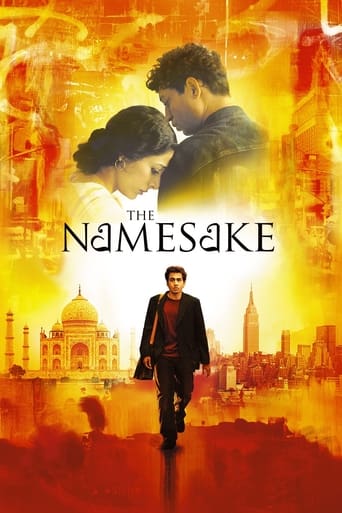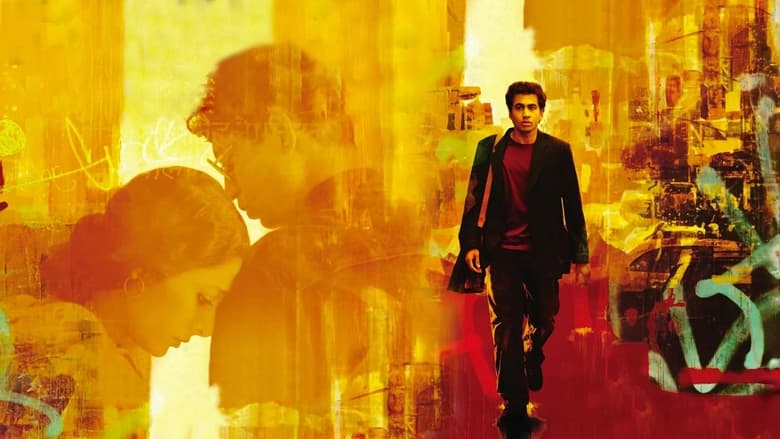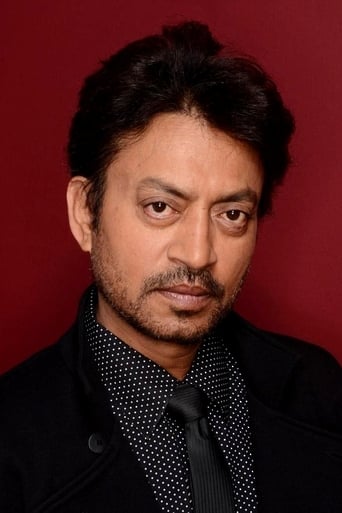The Namesake (2006)
After moving from Calcutta to New York, members of the Ganguli family maintain a delicate balancing act between honoring the traditions of their native India and blending into American culture. Although parents Ashoke and Ashima are proud of the sacrifices they make to give their children opportunities, their son Gogol strives to forge his own identity without forgetting his heritage.
Watch Trailer
Cast
Similar titles




Reviews
Fun premise, good actors, bad writing. This film seemed to have potential at the beginning but it quickly devolves into a trite action film. Ultimately it's very boring.
This is one of the few movies I've ever seen where the whole audience broke into spontaneous, loud applause a third of the way in.
All of these films share one commonality, that being a kind of emotional center that humanizes a cast of monsters.
A terrific literary drama and character piece that shows how the process of creating art can be seen differently by those doing it and those looking at it from the outside.
When it's at its best, "The Namesake", directed by Mira Nair, blends together the character building of the book by the same name (written by Jhumpa Lahiri), and the physicality of a movie. However, that is not always the case, as many times characters and emotions get jumbled together by poor acting and pacing issues. The story begins by following Ashoke, who marries Ashima, and they later have a son named Gogol. In the novel, one chapter is spent on this relationship, and much of the rest of the story is told from Gogol's perspective. The film takes much longer to get to Gogol, so when he does appear, the focus must shift to him. Instead, the movie continues to follow his family, making Gogol more and more irrelevant. When he finally has a crucial scene, the actor that portrays him (Kal Penn) does as good as a job as an eight-year-old could do. He reads his lines as if he was reading off of a teleprompter, and his actions seem stunted and choreographed. The absolutely horrendous acting causes the audience to lose interest quickly with Gogol. Irregularities with the novel, such as the exclusion of Ruth, Gogol's first girlfriend, hardly matter as the movie moves very abruptly about the time line, making quick, drastic cuts that can span over 10 years in one second. The continuous switching causes the audience to lose their connection with Gogol, and thus their connection to the movie as a whole. If you have not read the book, you may not feel that there are large gaps to fill. However, the differences, and exclusion between the movie and the book continue to grow as the movie progresses. First, we do not see the book save Ashoke's life. This is because Ms. Nair was trying to surprise us with the reveal later in the movie, so that exclusion was understandable. However, when Ruth doesn't appear, the book readers will start to furrow their brows. She is an essential part of Gogol's life, and without her, the payoff of Gogol finally finding someone like him, Moushumi, isn't as large. Also, Dmitri is excluded from the movie. Even though he was a small character in the book, he added much-needed depth to Moushumi's character, a depth which we never got while watching the movie.All in all, A book that was mostly built on character development, with very little plot, is one of the hardest subjects to base a movie on. Ms. Nair does a good job of trying to get all of the pieces to fit, but in the end, the movie doesn't function nearly as smooth as the book does. With a run time of only 122 minutes, it's hard to imagine a scenario where the movie can spend as long as the book in showing its audience certain settings and characters.Score: 5/10
Throughout the novel Gogol's life is explained in depth and through time. But in the movie time is not as evident and for example when Gogol in the novel finds out his wife is cheating on him there is a huge build up, starting with Moshumi getting frustrated with Gogol constantly and Gogol being completely in the dark about Moshumi's unhappiness. Moshumi finds a letter from an old flame that she ends up meeting and she becomes unlawful to her husband. Eventually Gogol finds out. But in the movie there is no build up there is old flame he just approaches her on the subject one day in the airport and they split apart. After the divorce almost a year later they show Ashima leaving their house permanently. But there is no apparent time difference it makes you believe that Gogol isn't even divorced by the time his mother moves back to India.
The NamesakeI saw this movie today. Didn't read the novel though but was able to connect I guess .It was a nice journey with Ashima,Ashoke,Gogol,Maxy,Ms Muzumdar,Mr Ghosh. Mira Nair again did a awesome job with the direction. The cinematography was commendable. The Howrah Railway station really reminds me of my commuting between Kharagpur and Kolkata. And the Howrah Bridge was revived from time to time, thus establishing the Indian connection. But the character that impressed me most is surely Ashima. She is perfect portrayal of Bengali woman, who is shy yet confident, childish yet mature. Tabu really did justice to Ashima. And Ashoke, his character was crafted very intricately. And then comes Gogol. His part, a teenage boy looking for way out and thus getting carried away and then his way back, Its Awesome.
The story of an immigrant couple and dilemma of the second generation immigrants are well portrayed in the film in general sense. What makes the movie good is its universal language. You can replace Indian immigrants with Chinese, Turks, Romanian, Arabs or others, you can replace the US with England, Australia or else. The story's main lines won't change. An eye-catching characteristics of the movie is its little warm and memorable moments. Especially during the first quarter of the movie, while two main characters, Ashima and Ashoke introduced. This is a plus for movies itself, but little bit arguable for the story. They are like warm touches to a sensitive issue. It makes you feel sympathy for the characters (and immigrants) and wants you to take a side in the issue, while the story never touches to the other side of the coin such as adaptation and cultural problems of immigrants or conservative structure of their lives. The story focuses on a most typical issue on immigrants dilemma in the living countries; Their names: their identities. Which gives a clue from which culture, from which religion you are coming from. Something that sometimes you are proud of and something that sometimes you wish /have to change. Self-criticism is missing in the movie. However, the movie doesn't claim that it is discussing the immigrant issue as a whole. Based on personal experience of an Indian immigrant in the States. So we can forgive that flaw. The movies have the audience's attention easily, flows smoothly. A big plus for the film is it's reaching to its target without any difficulty; the western societies, which continuously welcome ten thousands of immigrant from every corner of the world. So it gives us an extra idea to understand immigrants better, who are clamped, stuck and lost between two lives, two cultures. Sometimes the film repeats its gender's clichés (shrinking clothing washed by Ashima; Ashima's saying she had been missing India for years, then now she would miss The US, etc) but we also see some original approaches like Ashima's memorable quote "Do you want me say 'I love you' like Americans." As for the cinematic structure of the film, personally I don't think that transition in Gogol's personality/life looks very well real. It seems to be little bit rushed. This is not actor's fault anyway. Other than this, Kal Penn's performance is strong. I find her wife's performance little bit overacted. Although we have seen Alex's parents very briefly, we have a good idea about their life style. On the other side, Gogol's parents life could be digged little bit more. The movie's music, cinematography and general atmosphere don't take any risk and follow the film grammar closely. We don't see any cinematic essay, original tricks, surprising editing or else (that's why the movie losses 2 point in my opinion) but we see a smooth, easily-read, nicely done movie. (that's why the movie gets 8 points)Overall: 8 over 10.January 2009, Montreal











